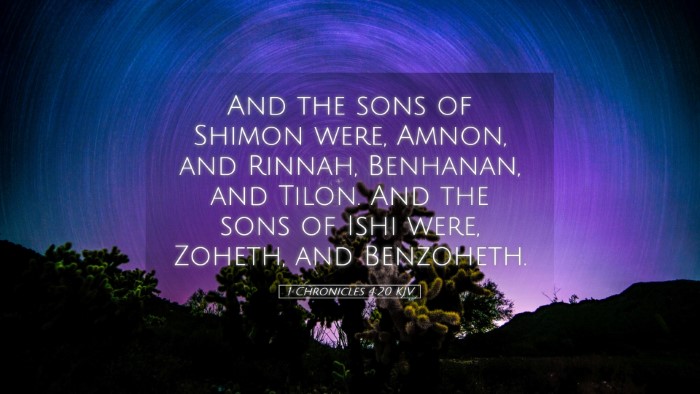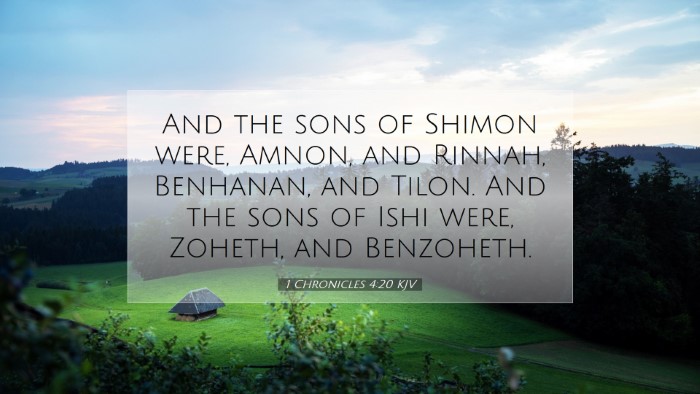Commentary on 1 Chronicles 4:20
Verse Reference: 1 Chronicles 4:20
"And all these are the children of Hushim."
Contextual Overview
The context of 1 Chronicles 4:20 lies within the genealogical records that are prominent throughout 1 Chronicles. The Chronicler's goal in these genealogies is to demonstrate the continuity of God's people and His promises through the lineage of Israel. Chapter 4 discusses the descendants of Judah and particularly highlights prominent figures and families.
Insights from Public Domain Commentaries
Matthew Henry
Matthew Henry focuses on the significance of genealogies as a testament to God's covenant promises. He remarks:
- The mention of Hushim's descendants illustrates God’s faithfulness in preserving the lineage.
- Henry draws attention to the pastoral aspect of genealogies, noting how they act as a reminder of God's covenantal relationship with His people.
- He highlights that even the lesser-known figures in Scripture have a place in God's redemptive narrative.
Albert Barnes
Albert Barnes provides a detailed examination of the name "Hushim" and its implications:
- He notes that Hushim is not a widely known figure, yet this verse encompasses a substantial meaning by acknowledging his descendants.
- Barnes emphasizes the importance of familial lines in understanding the history of Israel and the unfolding of God’s plan through generations.
- He also points out that this lineage serves as a reminder of God’s providential care and guidance through lesser-known families.
Adam Clarke
Adam Clarke expounds on the role of genealogies in establishing legitimacy and the divine purpose:
- He underscores that these records serve not only as historical documentation but as affirmation of specific tribes and their unique roles in Israel’s story.
- Clarke denotes that Hushim’s family stands as evidence that God's plan extends beyond the prominent figures and includes each member within the community.
- He cites the repetitiveness of such genealogical accounts as being crucial for the Jewish identity and the understanding of their history and heritage.
Theological Reflections
This verse encapsulates a rich theological truth—the inclusivity of God's chosen people. The mention of Hushim and his children may seem trivial at first glance, but it speaks profoundly about:
- Covenantal Faithfulness: God's promises extend through every generation, affirming His faithfulness across time and circumstance.
- Community Identity: Each individual, regardless of prominence, contributes to the larger story of salvation and community within the Body of Christ.
- God’s Sovereignty: The intricate details of genealogies illustrate God's meticulous planning and divine orchestration of history.
Challenges in Genealogy Interpretation
Commentaries often address the challenge posed by genealogical records, such as:
- Relevance Today: Some may question the significance of genealogical passages in the modern reader's faith journey.
- Historical Accuracy: The interpretations of genealogical records may vary, leading to different understandings of Israel's history.
- Theological Implications: How these genealogies relate to New Testament understandings of lineage and spiritual heritage can be complex yet rewarding explorations.
Conclusion
In 1 Chronicles 4:20, the mention of Hushim and his children serves to remind the reader of the intricate tapestry of God's people. It is a witness to God's faithfulness in preserving a descendant line that contributes to the whole of the biblical narrative. Pastors, theologians, and students alike are encouraged to reflect on these genealogies not merely as historical records but as living testimonies of God's ongoing work among His people.


